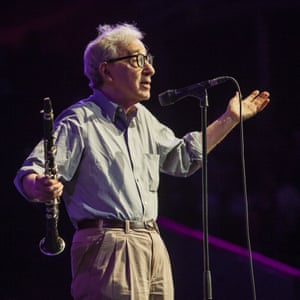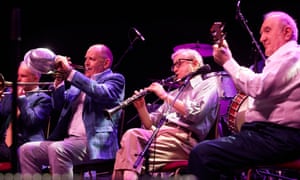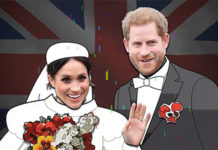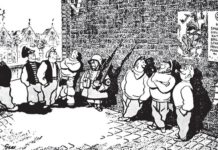Woody Allen & His New Orleans Jazz Band – a musician of ‘awful dreadfulness’? Not at all
Royal Albert Hall, London
The film-maker is a fine amateur clarinetist, and, at the Albert Hall, he and his polished band played a set that was a warm and tender tribute to jazz’s early years.
Back in his standup days in the 1960s, Woody Allen used to tell audiences that his grandfather was a man of such insignificance that at his funeral his hearse followed the other cars. Now 81, Allen takes much the same deferential view of his status in the vintage jazz band he’s played clarinet with in upmarket New York bars for over 35 years. Allen recently told the Today programme that “a musician of my awful dreadfulness” could only fill such an august establishment as the Royal Albert Hall by having international moviestardom for a day job. As his band genially swung and mournfully wailed its way through early 20th-century jazz vehicles on Sunday afternoon in a rammed Albert Hall, it was hard to disagree. Allen’s early contributions felt rather stilted and bleaty, but once he settled down it was, for the most part, apparent that his clarinet playing was closer to the superior-amateur than the awful-dreadfulness class.
Allen has been a jazz fan since his teens, which came in a postwar world where the nervy, virtuosic intricacies of bebop were dominant. But he preferred the singalong melodies and vivacious ragtime rhythms of the Jazz Age, before he was born, perhaps suggesting, as movies like Zelig or Sweet and Lowdown do, that he finds a romanticised past a more hospitable place than the present.
Indeed, Allen’s only nod to the present day was his opening statement, “I didn’t vote for him”, after which he made it plain that an entertaining faithfulness to jazz’s source material rather than bowler-hats-and-waistcoats showbiz was the point of the gig. For much of the show, Allen adopted an impassive seated pose, one beige-trousered leg slung over the other, grounded foot firmly tapping the beat, but he was more relaxed and loquacious with the audience – a strikingly diverse crowd – than he has been on previous London trips with the band.

‘I didn’t vote for him!’ Woody Allen and his clarinet at the Royal Albert Hall. Photograph: Marc Broussely/Redferns
Allen’s phrasing more frequently suggests the quirks and voicelike mannerisms of such clarinetists as Louis Armstrong’s 1920s partner Johnny Dodds rather than his first teenage model, Sidney Bechet. In his purer-toned moments, Allen’s clarinet glimpses the lyricism of New Orleans pioneer George Lewis. His band was polished and warmly attuned to the mix of bright dance tunes, racy bordello songs, street-marches and melancholy spirituals on which it draws. Trumpeter Simon Wettenhall was a standout soloist, bridging the bar-lines and embroidering the fills with an unhurried eloquence that packed far more improv into the tight confines of the tunes than they seemed to allow. WC Handy’s Aunt Hagar’s Blues was sung with economical affection by singer-banjoist Eddy Davis; the darkly shimmering Old Rugged Cross and the Latin-tinged Puerto Rico represented contrasts of mood the concert could have used a little more of (both drew Allen out of his defensively staccato phrasing into some expressive long-tone lyricism); bassist Greg Cohen showed how effortlessly he makes the transition from Tom Waits’ and the late Ornette Coleman’s music to this contrasting scenario; and the much-travelled Sweet Georgia Brown was delivered over a slinky groove with an affecting tenderness rather than the freneticism it often receives.











